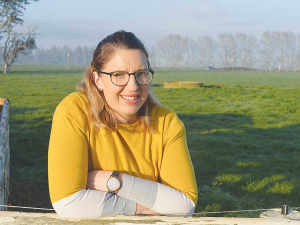Forum celebrates farmer network
The Dairy Environment Leaders (DEL) forum taking place in Wellington later this week is set to be an event filled with good information and future thinking, says DEL chair Melissa Slattery.
 Melissa Slattery believes it’s important the Government works closely with farmers on implementing changes because nothing is sustainable without profit.
Melissa Slattery believes it’s important the Government works closely with farmers on implementing changes because nothing is sustainable without profit.
Chair of Dairy Environment Leaders programme Melissa Slattery believes that sustainable farming is highly important to young farmers.
The Waikato farmer believes the upcoming generation of farmers are driven to learn and adapt, just like the previous generation did for the issues of their time.
“Opportunities will evolve for the new generation farmers who understand what is and will be required in terms of sustainability on farm,” Slattery told Rural News.
Slattery and her husband Justin own and operate a 300 cow, 106ha dairy farm near Te Aroha. She is an associate with a local chartered accountant firm. The Slatterys won the NZ Dairy Industry Awards 2015 Sharemilker/Equity Farmer of the Year title.
Last month, she was named chair of DairyNZ’s Dairy Environment Leaders programme. The programme is to foster stewardship for the future, and to support farmers to implement on-farm and catchment scale change to reduce their environmental footprint. Formed in 2013, there are now over 300 DEL leaders. Slattery has been part of the programme for the past three years.
The farming sector has seen its fair share of new policy and regulations, around water quality, nitrogen leaching, climate change and animal welfare. Slattery believes it’s important the Government works closely with farmers on implementing changes because nothing is sustainable without profit.
“If government and industry continue to work closely together for a common purpose of supporting productive, internationally competitive food production we will continue to be profitable,” she says.
“Farmers are resilient and adaptable, but system changes need time and capability.
“Decisions on farm are also becoming increasingly complex as implications of once simple challenges such as ‘how can this farm eat more home grown feed/ha’ are taken into account in terms of what it means for profit, water quality and greenhouse gas emissions. Availability of good advice and examples is also crucial and DairyNZ provides significant support in this regard.”
Slattery welcomes the intent of the Government’s freshwater regulations and encourages politicians to work with and listen to the ag sector.
“It is encouraging that the government has listened to the sector’s views to provide a consenting pathway to allow farmers time to implement the significant change some farmers must make to meet the proposed N-limit and maintain profitability,” she says.
There is now an opportunity for government to listen to the sector to ensure outcomes for intensive winter grazing are achieved practically and that the rules don’t distract from achieving that common purpose of good practice on-farm.
“There is more to interpret out of the legislation implementation of the National Policy Statement for Freshwater Management by regional councils - some of the impacts of the 95% nitrate toxicity and whether the contentious DIN is parked for good.
“Science, industry and regulation need to evolve to work together to achieve equitable solutions and positive outcomes for both the environment and our community.”
Expect more scrutiny
Melissa Slattery says farmers should expect more regulations around sustainability in the future.
“Nothing stays the same, everything evolves, especially regulations around sustainability,” she says.
Her advice to farmers is: be involved, stay informed and continue to build awareness on what is happening in your local community in terms of water quality.
“In the next round of regional plans, as councils look to implement the new National Policy Statement for Freshwater Management requirements, it will be even more important that farmers have a voice and input into the community discussions and council decisions.”
Slattery has these thoughts for farmers to consider: “For climate change be prepared to build awareness of your farm’s profile, what inputs influence that profile, and what levers you can pull.
“Remember that when it comes to reducing emissions, small reductions are important. So if you can reduce your empty rate through better mating management, that will bring a reduction in your greenhouse gas emissions (and improve your profitability).”
She urges farmers to complete their farm environment plans.
“If you haven’t done a farm environment plan, talk to your supplier about completing one.”
Fruit growers and exporters are worried following the discovery of a male Queensland fruit fly in Auckland this week.
Dairy prices have jumped in the overnight Global Dairy Trade (GDT) auction, breaking a five-month negative streak.
Alliance Group chief executive Willie Wiese is leaving the company after three years in the role.
A booklet produced in 2025 by the Rotoiti 15 trust, Department of Conservation and Scion – now part of the Bioeconomy Science Institute – aims to help people identify insect pests and diseases.
A Taranaki farmer and livestock agent who illegally swapped NAIT tags from cows infected with a bovine disease in an attempt to sell the cows has been fined $15,000.
Bill and Michelle Burgess had an eye-opening realisation when they produced the same with fewer cows.

OPINION: The release of the Natural Environment Bill and Planning Bill to replace the Resource Management Act is a red-letter day…
OPINION: Federated Farmers has launched a new campaign, swapping ‘The Twelve Days of Christmas’ for ‘The Twelve Pests of Christmas’ to…